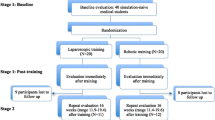Abstract
Laparoscopic surgery and robotic surgery, two forms of minimally invasive surgery (MIS), have recently experienced a large increase in utilization. Prior studies have shown that video game experience (VGE) may be associated with improved laparoscopic surgery skills; however, similar data supporting a link between VGE and proficiency on a robotic skills simulator (RSS) are lacking. The objective of our study is to determine whether volume or timing of VGE had any impact on RSS performance. Pre-clinical medical students completed a comprehensive questionnaire detailing previous VGE across several time periods. Seventy-five subjects were ultimately evaluated in 11 training exercises on the daVinci Si Skills Simulator. RSS skill was measured by overall score, time to completion, economy of motion, average instrument collision, and improvement in Ring Walk 3 score. Using the nonparametric tests and linear regression, these metrics were analyzed for systematic differences between non-users, light, and heavy video game users based on their volume of use in each of the following four time periods: past 3 months, past year, past 3 years, and high school. Univariate analyses revealed significant differences between heavy and non-users in all five performance metrics. These trends disappeared as the period of VGE went further back. Our study showed a positive association between video game experience and robotic skills simulator performance that is stronger for more recent periods of video game use. The findings may have important implications for the evolution of robotic surgery training.


Similar content being viewed by others
References
Carson JS, Smith L, Are M et al (2011) National trends in minimally invasive and open operative experience of graduating general surgery residents: implications for surgical skills curricula development? Am J Surg 202(6):720–726 (discussion 6)
Ficarra V, Novara G, Artibani W et al (2009) Retropubic, laparoscopic, and robot-assisted radical prostatectomy: a systematic review and cumulative analysis of comparative studies. Eur Urol 55(5):1037–1063
Sauerland S, Jaschinski T, Neugebauer EA (2010) Laparoscopic versus open surgery for suspected appendicitis. Cochrane Database Syst Rev (10):CD001546
Peters JH, Fried GM, Swanstrom LL et al (2004) Development and validation of a comprehensive program of education and assessment of the basic fundamentals of laparoscopic surgery. Surgery 135(1):21–27
Jalink MB, Goris J, Heineman E, Pierie JP, ten Cate Hoedemaker HO (2014) The effects of video games on laparoscopic simulator skills. Am J Surg 208(1):151–156
Adams BJ, Margaron F, Kaplan BJ (2012) Comparing video games and laparoscopic simulators in the development of laparoscopic skills in surgical residents. J Surg Educ 69(6):714–717
Harper JD, Kaiser S, Ebrahimi K et al (2007) Prior video game exposure does not enhance robotic surgical performance. J Endourol/Endourol Soc 21(10):1207–1210
Strasburger VC, Jordan AB, Donnerstein E (2010) Health effects of media on children and adolescents. Pediatrics 125(4):756–767
Fischer P, Greitemeyer T, Morton T et al (2009) The racing-game effect: why do video racing games increase risk-taking inclinations? Pers Soc Psychol Bull 35(10):1395–1409
Mazurek MO, Engelhardt CR (2013) Video game use in boys with autism spectrum disorder, ADHD, or typical development. Pediatrics 132(2):260–266
Mead C (2013) War Play. Boston, MA: Eamon Dolan/Houghton Mifflin Harcourt 2013
Mayo MJ (2009) Video games: a route to large-scale STEM education? Science 323(5910):79–82
Przybylski AK (2014) Electronic gaming and psychosocial adjustment. Pediatrics 134(3):e716–e722
Aghazadeh MA, Mercado MA, Pan MM, Miles BJ, Goh AC (2016) Performance of robotic simulated skills tasks is positively associated with clinical robotic surgical performance. BJU Int 118:475–481. doi:10.1111/bju.13511
Lyons C, Goldfarb D, Jones SL et al (2013) Which skills really matter? proving face, content, and construct validity for a commercial robotic simulator. Surg Endosc 27(6):2020–2030
Moglia A et al (2014) Distribution of innate ability for surgery amongst medical students assessed by an advanced virtual reality surgical simulator. Surg Endosc 28(6):1830–1837
Rosenberg BH, Landsittel D, Averch TD (2005) Can video games be used to predict or improve laparoscopic skills? J Endourol/Endourol Soc 19(3):372–376
Madan AK, Frantzides CT, Park WC, Tebbit CL, Kumari NV, O’Leary PJ (2005) Predicting baseline laparoscopic surgery skills. Surg Endosc 19(1):101–104
Rosser JC Jr, Lynch PJ, Cuddihy L, Gentile DA, Klonsky J, Merrell R (2007) The impact of video games on training surgeons in the 21st century. Arch Surg 142(2):181–186 (discusssion 6)
Kopta JA (1971) An approach to the evaluation of operative skills. Surgery 70(2):297–303
Abboudi H, Khan MS, Aboumarzouk O et al (2013) Current status of validation for robotic surgery simulators-a systematic review. BJU Int 111(2):194–205
Acknowledgements
We wish to thank Jason M. Heckert, BS, Matthew Knouse, BS, John M. St. Angelo, BS, and Jeffrey Naids, BS, at Temple University School of Medicine for their assistance with the acquisition of the study data.
Author information
Authors and Affiliations
Corresponding author
Ethics declarations
Conflict of interest
All authors wish to declare that they have no conflict of interest.
Additional information
Andrew C. Harbin and Kumar S. Nadhan contributed equally to the content of this manuscript.
Rights and permissions
About this article
Cite this article
Harbin, A.C., Nadhan, K.S., Mooney, J.H. et al. Prior video game utilization is associated with improved performance on a robotic skills simulator. J Robotic Surg 11, 317–324 (2017). https://doi.org/10.1007/s11701-016-0657-x
Received:
Accepted:
Published:
Issue Date:
DOI: https://doi.org/10.1007/s11701-016-0657-x




